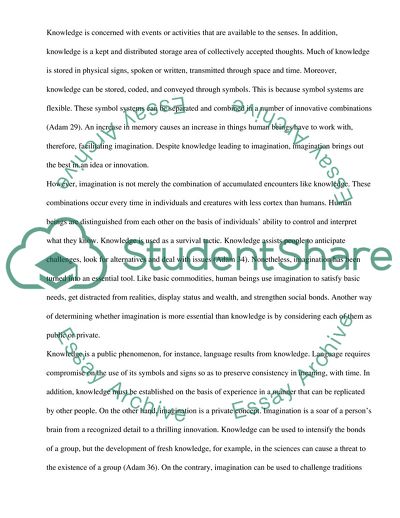Cite this document
(Imagination vs Knowledge in Theory of Knowledge Essay Example | Topics and Well Written Essays - 1250 words - 2, n.d.)
Imagination vs Knowledge in Theory of Knowledge Essay Example | Topics and Well Written Essays - 1250 words - 2. https://studentshare.org/philosophy/1781527-imagination-is-more-important-than-knowledge-for-knowledge-is-limited-to-all-we-now-know-and-understand-while-imagination-embraces-the-entire-world-and-all-there-ever-will-be-to-know-and-understand-albert-einstein-do-you-agree
Imagination vs Knowledge in Theory of Knowledge Essay Example | Topics and Well Written Essays - 1250 words - 2. https://studentshare.org/philosophy/1781527-imagination-is-more-important-than-knowledge-for-knowledge-is-limited-to-all-we-now-know-and-understand-while-imagination-embraces-the-entire-world-and-all-there-ever-will-be-to-know-and-understand-albert-einstein-do-you-agree
(Imagination Vs Knowledge in Theory of Knowledge Essay Example | Topics and Well Written Essays - 1250 Words - 2)
Imagination Vs Knowledge in Theory of Knowledge Essay Example | Topics and Well Written Essays - 1250 Words - 2. https://studentshare.org/philosophy/1781527-imagination-is-more-important-than-knowledge-for-knowledge-is-limited-to-all-we-now-know-and-understand-while-imagination-embraces-the-entire-world-and-all-there-ever-will-be-to-know-and-understand-albert-einstein-do-you-agree.
Imagination Vs Knowledge in Theory of Knowledge Essay Example | Topics and Well Written Essays - 1250 Words - 2. https://studentshare.org/philosophy/1781527-imagination-is-more-important-than-knowledge-for-knowledge-is-limited-to-all-we-now-know-and-understand-while-imagination-embraces-the-entire-world-and-all-there-ever-will-be-to-know-and-understand-albert-einstein-do-you-agree.
“Imagination Vs Knowledge in Theory of Knowledge Essay Example | Topics and Well Written Essays - 1250 Words - 2”. https://studentshare.org/philosophy/1781527-imagination-is-more-important-than-knowledge-for-knowledge-is-limited-to-all-we-now-know-and-understand-while-imagination-embraces-the-entire-world-and-all-there-ever-will-be-to-know-and-understand-albert-einstein-do-you-agree.


